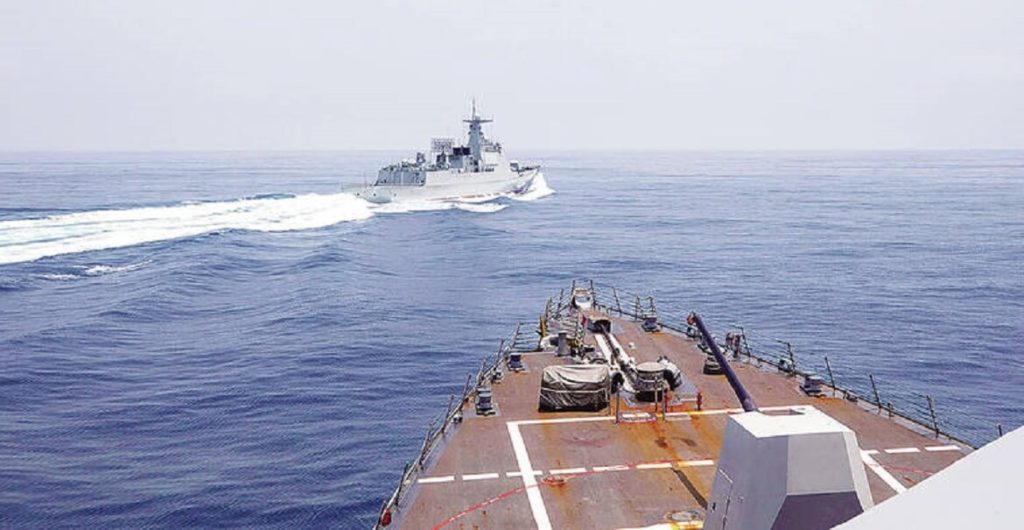By Taimoor Shah
In a world increasingly defined by regional power dynamics, the ongoing territorial dispute between the United States and China over Taiwan has emerged as a crucial flashpoint in the Asia-Pacific.

Both superpowers vie for influence and assert their interests in the complex web of international relations. However, the Taiwan issue, in particular, has become a center-stage struggle with the potential to shape the geopolitical order of the region for years to come.
In addition, the relationship between the United States and Taiwan has always been multifaceted. Historically, they have remained an economic and security partner. The United States maintains unofficial diplomatic ties with Taiwan while adhering to the “One China Policy,” which recognizes the People’s Republic of China as the legitimate government of China. In recent years, the United States has stepped up its support for the self-governing island, much to Beijing’s chagrin.
Why is Washington ready to go head-to-head with China for Taiwan? Taiwan holds significance for the United States because of its strategic location and semiconductor industry, which are crucial for global tech production. According to Ely S. Ratner, “Taiwan is located at a critical node within the first island chain, anchoring a network of U.S. allies and partners stretching from the Japanese archipelago down to the Philippines and into the South China Sea that is critical to the region’s security and critical to the defense of U.S. vital interests in the Indo-Pacific. In addition.” If China succeeds in annexing Taiwan, that would deter the US strategy of balancing China in the Asia-Pacific because China would indeed be able to constrain US military operations on the island by using underwater espionage devices, submarines, and air defense.
Certainly, China considers Taiwan an integral part of its mainland territory and remains committed to reunification; if necessary, it would use hard power. The Chinese government has taken a more assertive stance, bolstering its military capabilities and pursuing diplomatic isolation of Taiwan on the global stage. Beijing perceives any foreign interference or support for Taiwan’s autonomy as a violation of its sovereignty and a threat to its national interests and integrity.
Moreover, if China succeeds in annexing Taiwan, it could have absolute control of the South China Sea, thereby strengthening its naval power in the region against the United States and its allies. As a result, China would gain control of major trade routes in and out of the South China Sea and hit close U.S. allies, such as Japan, with increasing barriers to trade and supply. This would have damaging consequences for U.S. security, economy and trade in the Asia-Pacific.
Not surprisingly, the escalating tensions between the US and China have been evident in heightened military posturing, diplomatic confrontations, and the increased presence of naval forces in the Taiwan Strait. The US has conducted joint military exercises with Taiwan, emphasizing strategic deterrence and signaling its commitment to defending the island from any external aggression. China, on the other hand, has intensified military drills, sent military aircraft near Taiwan’s airspace, and vigorously protested against any official engagement between Taiwan and other countries. The risks remain high for the United States and China in this geopolitical tug-of-war. The US aims to protect its interests and preserve democratic values, while China seeks to consolidate its influence and maintain territorial integrity. As a result, the evolving US-China standoff on the Taiwan issue adds a new layer of complexity to an already fraught global landscape.
History repeated itself: the recent visit of US top officials, including Secretary of State Antony Blinken, on June 18–29, remained a hot topic for the international political community. The purpose of the visit was to ease tensions between Washington and Beijing and to continue open lines of communication between the two economic giants. However, Blinken’s visit has not disclosed any fruitful results. Beijing and Washington would not compromise over their interests in the region. As could be assumed during the meeting, Wang clearly emphasized that territorial integrity and unity would always be in the interest of China, and the US must respect China’s sovereignty and oppose the ‘independence of Taiwan.’ The stance indicates that China would not endure any activity regarding Taiwan, but the US would not allow China to annex Taiwan because of Washington’s national interests in the region. However, such dialogues are like traffic. The world needs more peace and functional democracies, but hope seems to have vanished with the growing competency among great powers.
Critically, China is committed to the reunification of Taiwan, whether through soft power or hard power, if required. Let’s assume that if Beijing attacks Taiwan, whether Washington chooses to intervene or not, that would have unpredictable strategic and economic repercussions. For instance, if the war erupts over Taiwan, it will trigger a global economic depression because Taipei’s industries manufacture over 60% of the world’s semiconductors and nearly 90 percent of the most advanced chips. If the world loses production, then there is no other alternative to overcome the gap. The supply of semiconductors prevents the supply of every product that contains technology, which primarily includes computers, gadgets, and cars.
In short, where would the escalation of political and strategic competencies between major powers take the world? Some hypotheses opine that the competition and tension among global powers would result in military conflict, which would have unprecedented repercussions, while others feel that it would not lead to war.
The U.S. must accept Taiwan as China’s sovereign territory because China would not compromise on Taiwan; in fact, should it compromise on Taiwan, China would also be expected to compromise on Hong Kong, Macau and the Exclusive Economic Zones (EEZs) in the South China Sea. Therefore, the Chinese will surely react to any U.S. intervention in Taiwan, and any tough action on either side would plunge the global powers into a destructive war that would have economic, military, political and technological consequences for the Asia-Pacific and the peace of the entire planet.
Author: Taimoor Shah – Student of MS-International Relations in International Islamic University Islamabad, (IIUI). His area of interest covers the World Politics and political and strategic affairs of great powers.
(The views expressed in this article belong only to the author and do not necessarily reflect the editorial policy or views of World Geostrategic Insights).
Image credit: U.S. Navy/AP (USS Chung-Hoon observes a Chinese navy ship conduct what it called an “unsafe” Chinese maneuver in the Taiwan Strait, Saturday, June 3, 2023).







